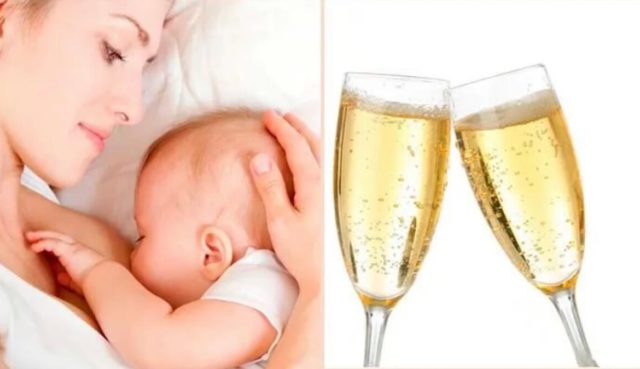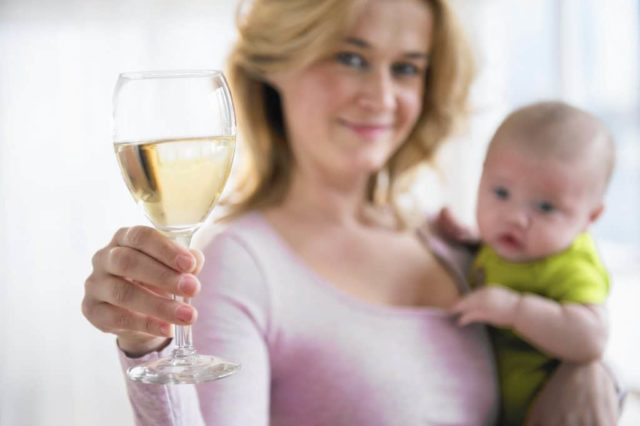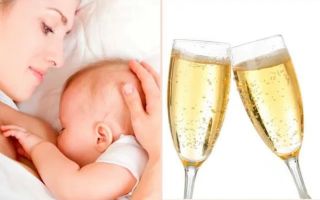Content
Doctors do not recommend drinking champagne while breastfeeding. But there is no categorical prohibition, doctors only advise to give up sparkling wines and other alcoholic beverages. But according to various studies, about 35% of breastfeeding women drank alcohol within the first 3 months after giving birth. Recommendations regarding the permissibility of including champagne on the menu differ from country to country.
Features of drinking alcohol while breastfeeding
Every mother should understand that alcohol passes into breast milk. The peak of its content is reached 30-60 minutes after taking. This period increases if you drink alcohol while eating. Drinking champagne with food reduces the concentration of alcohol in breast milk by 38%. These data were obtained as a result of research in 2008.
Doctors advise limiting alcohol consumption, although, according to some doctors, including pediatrician Komarovsky, there will be no harm from a glass of champagne while breastfeeding. But it is advisable to drink alcohol only in limited quantities.

Harmfulness of alcohol while breastfeeding
To decide whether to drink champagne, you need to know how it can affect the condition of a woman and a newborn. When it is used during breastfeeding, the hormones that are responsible for the secretion of milk begin to be produced worse in the mother's body. It can be produced in the same quantities, but it will be more difficult to suck it out. This affects the feeling of satiety and the emotional state of the newborn.
Champagne and other types of alcohol increase milk production but impair the flow of milk from the breast. As a result, the likelihood of developing lactostasis increases.
Regular and excessive consumption of champagne while breastfeeding can lead to such negative consequences in a newborn:
- increased excitability due to the effect of alcoholic beverages on the central nervous system;
- deterioration in sleep quality, decreased duration of rest periods;
- disruption of the heart, liver and respiratory system;
- problems with the functioning of the gastrointestinal tract, colic occur more often, attacks last longer.
If a mother abuses alcohol while breastfeeding, then the child develops signs of intoxication. There is a possibility of developing addiction.
But these consequences occur mainly in children whose mothers abuse alcohol. To reduce the risk, it is advisable to completely abandon alcohol. But from one glass of champagne, a child on GV should not be bad.
Is it possible to drink champagne while breastfeeding
Women who are breastfeeding should completely eliminate or minimize alcohol consumption. But from 1 glass of champagne, drunk with a good snack, there should be no harm. It must be remembered that alcohol is allowed to be consumed only occasionally. It shouldn't become a habit.
You can drink champagne for a nursing mother under the following conditions:
- the child should not be hungry, at least 2 hours after the feast should pass before the next latching on to the breast;
- before drinking an alcoholic drink, it is advisable to express milk and refrigerate or freeze;
- it is better to replace the next feeding after taking alcohol with expressed milk or a special infant formula.
Observations showed that babies suckle worse if their mother drank alcohol. They get hungry faster. This is due to the fact that it is more difficult for a newborn to get milk for itself, it does not flow out with the intensity to which the baby is accustomed.

How long can you breastfeed after champagne
Alcohol is removed for 2-3 hours. This time is needed to process 1 dose corresponding to 75 ml of wine. But the more champagne is drunk, the longer the period of cleansing the body will be. For each additional 75 ml of sparkling drink, add 3 hours to remove.
To prevent alcohol from entering the newborn's body with milk, mother should drink champagne immediately after feeding. If more than 75 ml of sparkling wine has entered the body, one or more breastfeeding should be skipped, depending on the dose of alcohol that has entered the body.
Some researchers argue that only a little alcohol gets into the milk of mothers during breastfeeding. Therefore, they believe that even strong intoxication is not scary. Drinking champagne will not accumulate clinically significant amounts of alcohol in breast milk. But comprehensive studies involving a large number of women have not been conducted.
Conclusion
It is undesirable to drink champagne while breastfeeding. But from the glass there will be no visible harm to the health of the newborn. It is impossible to determine whether the long-term consequences of such an effect on the child's body will arise. To avoid problems, it is better to give up alcoholic beverages during breastfeeding.

